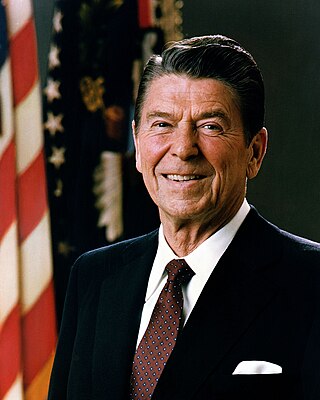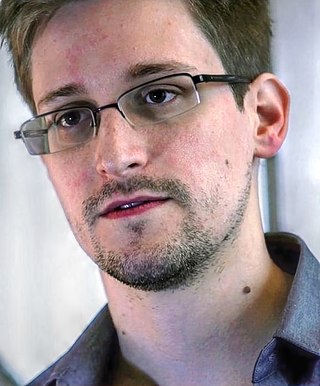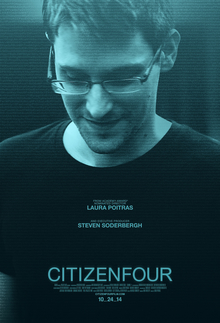
Executive Order 12333, signed on December 4, 1981 by U.S. President Ronald Reagan, was an executive order intended to extend powers and responsibilities of U.S. intelligence agencies and direct the leaders of U.S. federal agencies to co-operate fully with CIA requests for information. This executive order was titled United States Intelligence Activities.

NSA warrantless surveillance — also commonly referred to as "warrantless-wiretapping" or "-wiretaps" — was the surveillance of persons within the United States, including U.S. citizens, during the collection of notionally foreign intelligence by the National Security Agency (NSA) as part of the Terrorist Surveillance Program. In late 2001, the NSA was authorized to monitor, without obtaining a FISA warrant, phone calls, Internet activities, text messages and other forms of communication involving any party believed by the NSA to be outside the U.S., even if the other end of the communication lays within the U.S.

The Utah Data Center (UDC), also known as the Intelligence Community Comprehensive National Cybersecurity Initiative Data Center, is a data storage facility for the United States Intelligence Community that is designed to store data estimated to be on the order of exabytes or larger. Its purpose is to support the Comprehensive National Cybersecurity Initiative (CNCI), though its precise mission is classified. The National Security Agency (NSA) leads operations at the facility as the executive agent for the Director of National Intelligence. It is located at Camp Williams near Bluffdale, Utah, between Utah Lake and Great Salt Lake and was completed in May 2014 at a cost of $1.5 billion.

PRISM is a code name for a program under which the United States National Security Agency (NSA) collects internet communications from various U.S. internet companies. The program is also known by the SIGAD US-984XN. PRISM collects stored internet communications based on demands made to internet companies such as Google LLC and Apple under Section 702 of the FISA Amendments Act of 2008 to turn over any data that match court-approved search terms. Among other things, the NSA can use these PRISM requests to target communications that were encrypted when they traveled across the internet backbone, to focus on stored data that telecommunication filtering systems discarded earlier, and to get data that is easier to handle.

Edward Joseph Snowden is a United States and naturalized Russian citizen who was a computer intelligence consultant and whistleblower who leaked highly classified information from the National Security Agency (NSA) in 2013 when he was an employee and subcontractor. His disclosures revealed numerous global surveillance programs, many run by the NSA and the Five Eyes intelligence alliance with the cooperation of telecommunication companies and European governments and prompted a cultural discussion about national security and individual privacy.

Ongoing news reports in the international media have revealed operational details about the Anglophone cryptographic agencies' global surveillance of both foreign and domestic nationals. The reports mostly emanate from a cache of top secret documents leaked by ex-NSA contractor Edward Snowden, which he obtained whilst working for Booz Allen Hamilton, one of the largest contractors for defense and intelligence in the United States. In addition to a trove of U.S. federal documents, Snowden's cache reportedly contains thousands of Australian, British, Canadian and New Zealand intelligence files that he had accessed via the exclusive "Five Eyes" network. In June 2013, the first of Snowden's documents were published simultaneously by The Washington Post and The Guardian, attracting considerable public attention. The disclosure continued throughout 2013, and a small portion of the estimated full cache of documents was later published by other media outlets worldwide, most notably The New York Times, the Canadian Broadcasting Corporation, the Australian Broadcasting Corporation, Der Spiegel (Germany), O Globo (Brazil), Le Monde (France), L'espresso (Italy), NRC Handelsblad, Dagbladet (Norway), El País (Spain), and Sveriges Television (Sweden).

The global surveillance disclosure released to media by Edward Snowden has caused tension in the bilateral relations of the United States with several of its allies and economic partners as well as in its relationship with the European Union. In August 2013, U.S. President Barack Obama announced the creation of "a review group on intelligence and communications technologies" that would brief and later report to him. In December, the task force issued 46 recommendations that, if adopted, would subject the National Security Agency (NSA) to additional scrutiny by the courts, Congress, and the president, and would strip the NSA of the authority to infiltrate American computer systems using "backdoors" in hardware or software. Geoffrey R. Stone, a White House panel member, said there was no evidence that the bulk collection of phone data had stopped any terror attacks.
The Fourth Amendment Protection Acts, are a collection of state legislation aimed at withdrawing state support for bulk data (metadata) collection and ban the use of warrant-less data in state courts. They are proposed nullification laws that, if enacted as law, would prohibit the state governments from co-operating with the National Security Agency, whose mass surveillance efforts are seen as unconstitutional by the proposals' proponents. Specific examples include the Kansas Fourth Amendment Preservation and Protection Act and the Arizona Fourth Amendment Protection Act. The original proposals were made in 2013 and 2014 by legislators in the American states of Utah, Washington, Arizona, Kansas, Missouri, Oklahoma and California. Some of the bills would require a warrant before information could be released, whereas others would forbid state universities from doing NSA research or hosting NSA recruiters, or prevent the provision of services such as water to NSA facilities.

The USA Freedom Act is a U.S. law enacted on June 2, 2015, that restored and modified several provisions of the Patriot Act, which had expired the day before. The act imposes some new limits on the bulk collection of telecommunication metadata on U.S. citizens by American intelligence agencies, including the National Security Agency. It also restores authorization for roving wiretaps and tracking lone wolf terrorists. The title of the act is a ten-letter backronym that stands for Uniting and Strengthening America by Fulfilling Rights and Ensuring Effective Discipline Over Monitoring Act of 2015.

Upstream collection is a term used by the National Security Agency (NSA) of the United States for intercepting telephone and Internet traffic from the Internet backbone, meaning major Internet cables and switches, both domestic and foreign. Besides the Upstream collection, NSA also gathers information from Internet communications through arrangements with Internet companies under the program codenamed PRISM. Both the Upstream programs and PRISM are part of the Special Source Operations (SSO) division, which is responsible for collection in cooperation with corporate partners.

The FISA Improvements Act is a proposed act by Senator Dianne Feinstein, Chair of the Senate Intelligence Committee. Prompted by the disclosure of NSA surveillance by Edward Snowden, it would establish the surveillance program as legal, but impose some limitations on availability of the data. Opponents say the bill would codify warrantless access to many communications of American citizens for use by domestic law enforcement.

Former U.S. President Barack Obama favored some levels of mass surveillance. He has received some widespread criticism from detractors as a result. Due to his support of certain government surveillance, some critics have said his support may have gone beyond acceptable privacy rights. This is of course a debatable conclusion. Many former US presidents have increased the abilities and techniques used for intelligence gathering. President Obama released many statements on mass surveillance.
The Privacy and Civil Liberties Oversight Board report on mass surveillance was issued in January 2014 in light of the global surveillance disclosures of 2013, recommending the US end bulk data collection.

Global surveillance and journalism is a subject covering journalism or reporting of governmental espionage, which gained worldwide attention after the Global surveillance disclosures of 2013 that resulted from Edward Snowden's leaks. Since 2013, many leaks have emerged from different government departments in the US, which confirm that the National Security Agency (NSA) spied on US citizens and foreign enemies alike. Journalists were attacked for publishing the leaks and were regarded in the same light as the whistleblowers who gave them the information. Subsequently, the US government made arrests, raising concerns about the freedom of the press.

Global surveillance whistleblowers are whistleblowers who provided public knowledge of global surveillance.
Commentary on Edward Snowden's disclosure is part of the reactions to global surveillance disclosures made by Edward Snowden.

MYSTIC is a former secret program used since 2009 by the US National Security Agency (NSA) to collect the metadata as well as the content of phone calls from several countries. The program was first revealed in March 2014, based upon documents leaked by Edward Snowden.

Citizenfour is a 2014 documentary film directed by Laura Poitras, concerning Edward Snowden and the NSA spying scandal. The film had its US premiere on October 10, 2014, at the New York Film Festival and its UK premiere on October 17, 2014, at the BFI London Film Festival. The film features Snowden and Glenn Greenwald, and was co-produced by Poitras, Mathilde Bonnefoy, and Dirk Wilutzky, with Steven Soderbergh and others serving as executive producers. Citizenfour received critical acclaim upon release, and was the recipient of numerous accolades, including Best Documentary Feature at the 87th Academy Awards. This film is the third part to a 9/11 trilogy following My Country, My Country (2006) and The Oath (2010).

ICREACH is an alleged top-secret surveillance-related search engine created by the United States National Security Agency (NSA) after the September 11 attacks.
Ben Wizner is an American lawyer, writer, and civil liberties advocate with the American Civil Liberties Union. Since July 2013, he has been the lead attorney of NSA whistleblower Edward Snowden.











